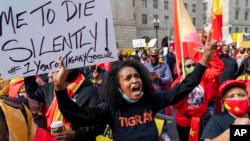The U.N. Security Council on Friday called for an end to fighting in Ethiopia and expressed serious concern about the intensifying conflict in the country’s northern Tigray region.
In a statement approved by all 15 members, the council urged all parties in Ethiopia “to put an end to hostilities and to negotiate a lasting cease-fire.”
The council also "called for refraining from inflammatory hate speech and incitement to violence and divisiveness."
The statement comes a day after the first anniversary of the start of the conflict in Tigray. It is only the second time that the U.N. Security Council has issued a statement on Ethiopia since the fighting began.
"Today the Security Council breaks six months of silence and speaks again with one united voice on the deeply concerning situation in Ethiopia," Ireland's U.N. Ambassador Geraldine Byrne Nason said in a statement. She said it was the first time that the council called for an end to hostilities in Ethiopia.
Council members said the language in the statement was amended to remove a call for an “immediate” end to hostilities “without preconditions” because of objections from Russia, according to The Associated Press.
The U.N. call comes as Tigray forces in Ethiopia announced Friday that they have formed an alliance with other armed and opposition groups around the country, including forces in the Oromo region, in order to end the government of Prime Minister Abiy Ahmed. They said they were willing to bring down the prime minister through negotiation or force.
Ethiopia's government called the creation of an alliance “a publicity stunt.”
According to Reuters, a group of anti-government forces is threatening to march into the capital, Addis Ababa.
The U.S. State Department on Friday urged all Americans to leave Ethiopia “as soon as possible,” according to a security alert posted on the website of the U.S. Embassy in Addis Ababa.
The alert called the security situation in the country “very fluid.”
The State Department also warned Americans on its travel advisory website, saying: “Do not travel to Ethiopia due to armed conflict, civil unrest, communications disruptions, crime, and the potential for terrorism and kidnapping in border areas.”
The Ethiopian government declared a six-month state of emergency Wednesday and called on residents to defend their neighborhoods if rebels arrive in the capital.
Thursday marked the first anniversary of Prime Minister Abiy’s deployment of troops to Tigray in response to forces of the Tigray People’s Liberation Front seizing military bases a day earlier. The ensuing conflict has killed thousands of people, displaced several million from their homes and left 400,000 residents of Tigray facing famine, according to a July estimate by the United Nations.
A joint investigation by the United Nations and the government-created Ethiopian Human Rights Commission published findings on Wednesday that all sides in the conflict have committed human rights violations, including torturing civilians, gang rapes and arresting people based on ethnicity.
U.N. High Commissioner for Human Rights Michelle Bachelet said some of those abuses may amount to war crimes and crimes against humanity.
Some information in this report comes from Reuters and the Associated Press.







